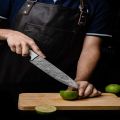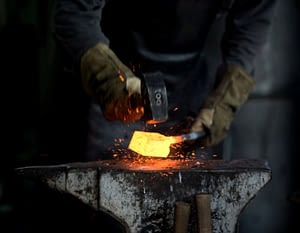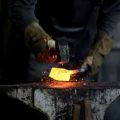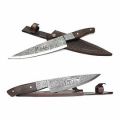Best Chef Knives
A knife is a powerful tool for a chef, the best knife is almost their arm extension. For a comfortable cooking experience, there are different types of knives. Each made for a specific use that chefs around the world prefer.
Knives are understandably the most valuable tool a cook has. A quality knife helps you prepare food efficiently. While choosing from different types of knives, buy the one constructed from high quality material by experienced craftsmen. Chefs prefer both Damascus and stainless steel.
Do you ever have difficulty choosing from various knives? Well, we got you covered! Read along and find out your next favorite knife.

Meet the family of knives!
Chef Knife
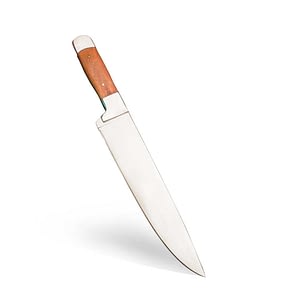
You can call this one Mr. Perfect. Yes! It‘s that cousin who’s friends with everyone. Cooks use it for thinly slicing, dicing, separating large cuts of meat, and mashing garlic cloves with the blade sides. When buying a chef knife, you need to look for a handle that fits your hand and is not overly heavy. The knife should feel balanced and weighty enough to divide meat from the bone. It mostly has an 8-inch blade. This length provides plenty of power without being heavy. A good chef’s knife’s edge should have a long, gently sloping curve suited to the rocking motion of mincing and chopping.
–Perfect size (not too long or short)
–Lighter in weight
–All–rounder
Paring Knife
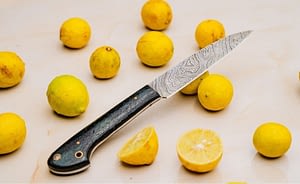
A paring might seem smaller than others, but you can trust it for peeling, slicing, coring. Moreover, with fine work such as removing vanilla beans from the pod. When buying a paring knife, you need to look for a thin edge that’s also spear pointed or, for fast, exact cuts, is flat so it’s flush with the cutting board. It has a 3- to 3 ½-inch blade that‘s just right for various cutlery tasks. It‘s great for agility, sharp, agile edge that can fit into tight corners and handle tight curves when peeling and paring.
–Powerful blade
–Small so, easy to use
–Best for hard to reach places
Carving Knife
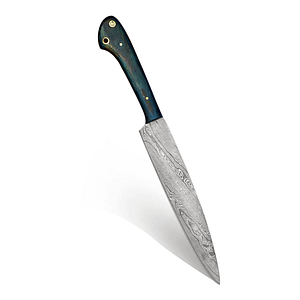
Used for making thin cuts of meat from a larger cut. When buying a carving knife, you need to look for a long, narrow, very sharp cutting edge with a pointed tip. It should have less curvature {arc or bend} than the chef’s knife as it’s for slicing rather than rocking. It has a 12–inch blade with a rounded tip. It cuts through large cuts of meat, as well. A rounded tip is vital for easy slicing because it won’t get snagged {cut roughly} on meat the way a pointed tip would cut down. Get a grant-edged knife: These knives have elliptical scallops carved into both sides of the blade, creating a thinner knife.
–Large blade for meat
–Crave thinner slices
Serrated Knife / Bread Knife
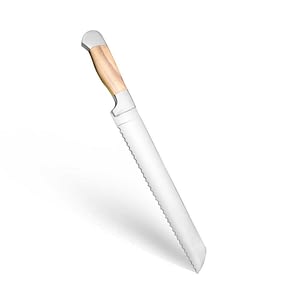
Used with foods with a coarse crust or smooth, soft skin, such as cake, bread, or large tomatoes where accuracy isn’t needed. When buying a carving knife, you need to look for a long edge, a comfortable handle, and deep, pointed serrations. A 10 to 12-inch blade; Knives shorter than 10 inches lead to catching their tips on larger loaves. The knife should also be slightly flexible for better movement; however, firm enough to allow for proper control. A curved knife makes cutting easier. A somewhat curved blade helps a rocking motion keeping your knuckles from rubbing on the cutting board.
–Sharpened grooves
–Rigged all the way long
–King of slicing
–Mess free slices of bread and cakes
Santoku Knife
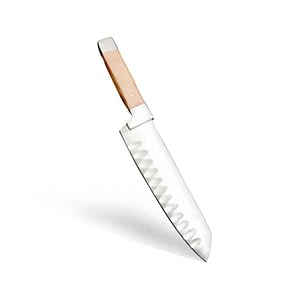
The great Santoku Knife is magical. The most interesting fact about this knife is the full name “Santoku Bocho knife”. It translates into three uses. Therefore, it can do various jobs. The overall length of this beauty is 11-inches with a 6.5-inch blade. Furthermore, the most adoring feature is the handle made with Pakka wood. Its handle normally has a 4.5 inch length. Chef uses Santoku Knife for a variety of cutting tasks. Usually, the core of this knife is to mincing meat and dicing vegetables. This knife is flawless for slicing fish. This knife is a coring knife for all cooks.
–Straight edge.
–Narrow sheep‘s foot blade.
-in-1 action (mincing, slicing, dicing)
Boning Knife
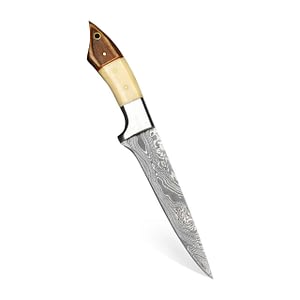
The Best Boning Knife is very remarkable. Most cooks use this knife for removing the bones of poultry, meat, fish, and pork. This knife is also best for preparing meat, peeling pineapples, and also for baked items occasionally. It has many similar qualities to a fillet knife, but a fillet knife is lighter and flexible. Contrary to this best boning knife is easier and stiff. This Best Boning knife has a razor-sharp blade of stainless steel. This knife has a sharp point and a narrow blade. This makes it suitable for piercing meat easier and safer. It also has a lovely rose wooden handle. It provides an unyielding grip to a chef. The Blade length of this knife is 6.5“ with a 4.5″ handle.
–Long
–Thin and flexible blade
–Sharp tip
Meat Cleaver

The best meat cleaver is probably the most robust character in the knife family. A cleaver is a large knife that varies in its shape but usually resembles a rectangular-blade hatchet. The chef mainly uses it for chopping large items. Cooks use it to split up large pieces of bones and through thick pieces of meat. Professionals also call it Bone Chopper. Most of these butcher knives have an overall length of 12.5-inches.

